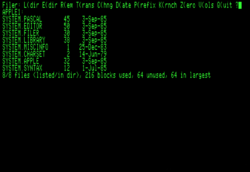UCSD Pascal
 |
|
| Developer | University of California, San Diego, SofTech, Pecan |
|---|---|
| OS family | p-code operating systems |
| Working state | Historic |
| Initial release | 1978 |
| Latest release | Version IV.2 |
| Available in | English |
| Platforms | Apple II, DEC PDP-11, Zilog Z80, MOS 6502, Motorola 68000, x86, Pascal MicroEngine, TI 99/4A |
| Kernel type | p-code virtual machine |
UCSD Pascal was a Pascal programming language system that ran on the UCSD p-System, a portable, highly machine-independent operating system. UCSD Pascal was first released in 1978. It was developed at the University of California, San Diego (UCSD).
In 1978, the University of California, San Diego (UCSD) Institute for Information Systems developed UCSD Pascal to provide students with a common environment that could run on any of the then available microcomputers as well as campus DEC PDP-11 minicomputers. The operating system became known as UCSD p-System.
UCSD p-System was one of three operating systems, along with PC DOS and CP/M-86, that IBM offered for its original IBM PC. Vendor SofTech Microsystems emphasized p-System's application portability, with virtual machines for 20 CPUs as of the IBM PC's release. It predicted that users would be able to use applications they purchased on future computers running p-System; advertisements called it "the Universal Operating System".
PC Magazine denounced UCSD p-System on the IBM PC, stating in a review of Context MBA, written in the language, that it "simply does not produce good code". The p-System did not sell very well for the IBM PC, because of a lack of applications and because it was more expensive than the other choices. Previously, IBM had offered the UCSD p-System as an option for Displaywriter, an 8086-based dedicated word processing machine (not to be confused with IBM's DisplayWrite word processing software). (The Displaywriter's native operating system had been developed completely internally and was not opened for end-user programming.)
...
Wikipedia
